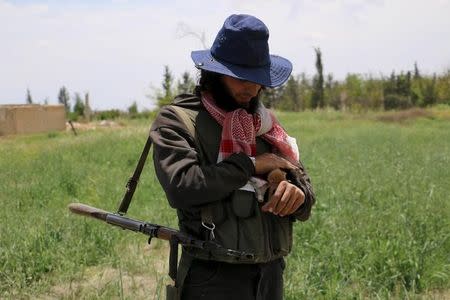Syrian rebel group casts new doubt on peace process, wants missiles

BEIRUT (Reuters) - A large Syrian rebel group has said the best way to push Damascus to a political settlement of the country's civil war was to give insurgents anti-aircraft missiles and has pledged to control the arms if provided. Islam Army (Jaysh al-Islam), echoing opposition concerns over a United Nations-led drive to launch peace talks in Geneva on Jan. 25, also said it was unacceptable to talk about a political solution to the war while people died of hunger and bombardment. The opposition to President Bashar al-Assad wants goodwill measures including a ceasefire, a detainee release and the end of blockades on besieged areas before starting negotiations. U.N. envoy Staffan de Mistura is shuttling around the region to prepare for the talks, part of a plan endorsed by the Security Council last month to end the five-year-war that has killed 250,000 people and created millions of refugees. Islam Army, part of a newly formed council to oversee the negotiations on the opposition side, said the "best way to force the regime to accept the (political) solution and stick by it" was to allow states that back the opposition to supply rebels with anti-aircraft missiles. The statement, sent by the group's spokesman overnight, said it would guarantee the missiles would not reach groups that would use them "illegally". Foreign governments including the United States and Saudi Arabia have provided rebels with military support, but have resisted demands for missiles for fear they would end up with hardline jihadist groups such as Islamic State. The Syrian government says Islam Army is a terrorist group, like all the groups that fighting to topple Assad, who has received crucial support from Russia and Iran. Both states have sent forces to help him fight the insurgency. The Syrian government told de Mistura on Saturday it was ready to take part in Geneva talks but stressed the need to see the names of the Syrian opposition figures who will take part. Pointing to another potential complication, Foreign Minister Walid al-Moualem also stressed the need for the government to obtain a list of groups that would be classified as terrorists as part of the peace process. Islam Army said the success of the political process "depended on the seriousness of the international community in putting pressure on the criminal regime to halt the killing". Opposition officials have already cast doubt on whether the talks will go ahead on schedule, citing the need to see the goodwill measures from the government side. Separately, the Britain-based Syrian Observatory for Human Rights said the death toll from Russian aerial strikes on a rebel-held town in northern western Syria on Saturday climbed to 81 people with at least 52 civilians among the dead. The dead included 23 fighters from Nusra and 6 Islamist fighters, in the latest update by the independent monitor on casualties. [L8N14T0NQ] The raids hit court house and prison run by al Qaeda’s offshoot Nusra Front and residential areas in the town of Maarat al-Numan, a major urban centre in Idlib province whose towns have been the targets of intense Russian bombing in the last two months. Rescue workers and rights groups say Russia's bombing in Syria has killed scores of civilians at busy market places and in residential areas. Russia denies this. Jets also believed to be Russian pounded Talbisa and Rastan towns in Homs province and the southern town of Sheikh Maskin, part of Moscow's major military intervention to help the Syrian army gain ground lost to rebels, the monitor and activists said. (Writing by Tom Perry; Editing by Tom Heneghan)

